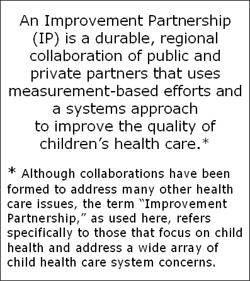
The Vermont Child Health Improvement Program's (VCHIP) Improvement Partnerships initiative, a program at the University of Vermont supported by the Commonwealth Fund and the Vermont Department of Health, has teamed up with the National Initiative for Children's Healthcare Quality (NICHQ), to build state and regional capacity for enhancing developmental and preventive services for young children. To date, five states or regions have been selected through an application process to form new Improvement Partnerships.
The growing number of Improvement Partnerships across the country—and rising interest from others wishing to develop IPs—has prompted a need to gather information about this approach to quality improvement. With support from the Commonwealth Fund, VCHIP is developing a Monograph for the diffusion and marketing of the Improvement Partnerships concept and a Guide to highlight various models of Improvement Partnerships including tools and information to establish a new Improvement Partnership. In the coming months we hope to expand this work to additional states and regions.
Newly Established Improvement Partnership Sites
Arizona Chapter of the American Academy of Pediatrics—The Arizona Quality (AZQ) project is a partnership between office-based practitioners and governmental and health insurance organizations working to promote quality health care for Arizona's children. The initial Learning Partnership focuses on implementing the use of a validated developmental screening tool, the Parent Evaluation of Developmental Status (PEDS), in well-child visits.
New York State—Empire State Child Health Improvement Partnership (ES-CHIP) represents a collaboration of the New York State Department of Health, American Academy of Pediatrics—New York State Chapter I, Academy of Family Physicians—New York State Chapter, and New York State Family Voices. The Child Development Learning Collaborative will bring together up to 10 practice/clinic child development teams. The practices/clinics will improve their capacity to conduct child development surveillance and screening for young children. The Child Development Teams will consist of clinical and administrative staff along with a family representative.
Rhode Island—The Rhode Island Chapter of the American Academy of Pediatrics and the Rhode Island Department of Health are working to increase the number of young children receiving comprehensive developmental screening and appropriate assessment and intervention services by developing a model to integrate developmental screening into the Medical Home and design referral pathways and build relationships between families, health care providers, child care providers, and developmental intervention services. The model will expand the Pediatric Practice Enhancement Project (PPEP) which places trained Parent Consultants in primary care pediatric offices to assist families in accessing an array of medical and non-medical services.
Washington State Public Health, Seattle & King County—The Children's Preventive Health Care Collaborative is an initiative for improving the delivery of preventive services to low-income children statewide. A comprehensive, integrated set of preventive services, including medical, dental, developmental and mental health services, is vital for children. Now in its second year, this collaborative focuses on integrating oral health and developmental screening and referrals into children's primary care services.
Washington, DC Partnership to Improve Children's Healthcare Quality (DC-PICHQ)—Overall goal is to improve healthcare quality and outcomes for children in Washington, DC through practice-based change and community-based partnerships. DC-PICHQ will piloting & implement city-wide standardized well-check/preventive care medical records forms for all Medicaid-enrolled children, populate a registry with secure provider access, implement enhanced reimbursement for fully comprehensive, documented & submitted visit ("pay for performance" Medicaid pilot), and utilize the registry to benchmark city-wide delivery of services, gaps and target/measure for improvement interventions.


